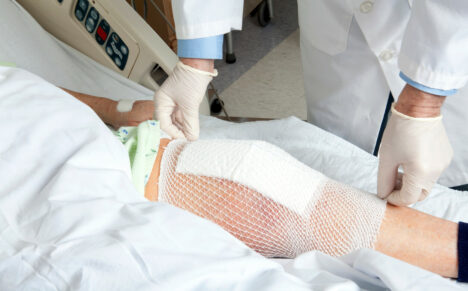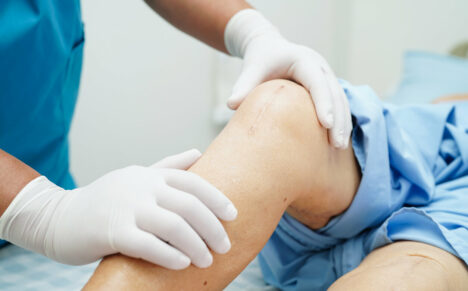Each year, as many as 200,000 Americans undergo hip replacement surgery, which has become one of the safest surgeries for doctors to perform. In fact, the success rate for this procedure is extremely high, and very few patients report any kind of surgical complications, including blood clots.
This surgery involves removing the damaged sections of your hip joint and replacing them with artificial (prosthetic) parts that are made of bio-grade metal, ceramic, and/or plastic. Recovery time involves the bone and other natural tissues healing and merging onto the new prosthetic materials, so this can cause a minimal amount of pain while your hip heals, a crucial aspect of hip replacement recovery.
While the hip replacement surgery procedure is designed to improve your range of motion and alleviate any hip pain you may have, especially from hip arthritis, a certain amount of short-term soreness following your surgery is to be expected. Your orthopedic doctor will likely prescribe a pain management plan, and they may recommend taking over-the-counter medication for any future occasional pain relief – such as acetaminophen (Tylenol) in dosages of up to 3,000 milligrams per day as recommended by the Food & Drug Administration (FDA).
Let’s talk about what it feels like after having total hip replacement surgery, and where you can go in Raleigh and the Triangle area for outstanding orthopedic treatment.
Pain Associated with Hip Replacement
You will experience a certain amount of temporary pain in the hip region following your hip surgery, but this is a muscular soreness, and typically nothing compared to the pain you have been dealing with prior to the procedure. You may feel this muscular soreness in the groin or thigh area while your body adjusts to the improved changes in your hip joint.
You may experience minimal pain in the knee due to the change at the top of your upper leg bone, but most referred pains from hip arthritis before surgery should be gone. This type of pain can be alleviated by working with your physical therapist to restore your mobility and get your strength back, an important part of hip replacement recovery.
As with any surgery, it is normal to experience some pain or discomfort at the site of your incisions as part of the healing process. Fortunately, improved surgical techniques – such as minimally invasive smaller surgical instruments which need only small incisions – allow for surgery that preserves the adjacent muscles and soft tissues, thereby reducing the level of pain you should expect after surgery.
When Will the Pain Go Away After Hip Surgery?
While every patient’s recovery time is unique based on various personal factors, including your own underlying health, most hip replacement patients experience minor intermittent pain for about two to four weeks after their procedure. Things such as your medical history, your activity level, and the level of pain you were dealing with before your surgery will all factor into how long it will take you to achieve a full recovery.
The fewer health issues you have, the faster you can expect to recover. To speed up your recovery and gradually alleviate any lingering pain, it is important to follow your prescribed physical therapy exercise regimen and your medication schedule. This approach will assist in achieving a full recovery and enable a smoother return to work.
If your pain persists beyond the normal recovery period, or if you experience issues that may require revision surgery, you should follow up with your surgeon for evaluation and repeat X-ray examination of your new joint.
Minimize Pain and Maximize Recovery Throughout The Hip Replacement Process
After answering the question “how painful is a hip replacement” you may be wondering how to minimize any pain and maximize your recover throughout the process.
Pre-Surgery Preparation
Before undergoing hip replacement surgery, it’s essential to prepare both physically and mentally. Engaging in prescribed exercises can strengthen the muscles around your hip, which not only minimizes post-surgery pain but also accelerates your recovery. Nutrition also plays a critical role: a well-balanced diet rich in vitamins and minerals can enhance your body’s healing process. Mental preparation, including understanding the procedure and setting realistic expectations, helps in reducing anxiety and improving post-surgery outcomes.
Day of Surgery – What to Expect
On the day of your hip replacement surgery, you’ll be under the care of a team of medical professionals dedicated to ensuring your comfort and safety. The procedure itself involves minimally invasive techniques to reduce tissue damage and pain. Anesthesia will be administered to ensure you feel no pain during the surgery. Understanding the procedure’s steps can help alleviate any fears or anxieties, contributing to a more positive mindset, which is crucial for a smooth recovery.
Immediate Post-Surgery Care
The first few hours and days after your surgery are pivotal for your recovery journey. You’ll be closely monitored by medical staff to manage any immediate post-operative pain. Pain management is a priority, often involving a combination of medications to reduce discomfort and inflammation. Early mobilization, under the guidance of a physiotherapist, starts almost immediately. This early movement is crucial for preventing stiffness, reducing the risk of blood clots, and speeding up the process towards a full recovery.
In this crucial phase, your healthcare team will provide comprehensive support, ensuring that your pain is managed effectively and that your recovery is on the right track. By following their guidance and staying committed to your recovery plan, you’ll be taking significant steps towards regaining your mobility and returning to your daily activities with confidence.
The Role of Physical Therapy in Pain Reduction
Physical therapy plays a crucial role in your journey towards full recovery after a hip replacement. It’s not just about regaining strength and mobility; it’s also a vital component of effective pain management. After your hip replacement surgery, a physical therapist will work closely with you to develop a personalized exercise plan, tailored to your specific needs and recovery goals.
From the very first day after surgery, physical therapy begins with simple movements. These early exercises are designed to promote circulation, which is essential for preventing blood clots and reducing swelling, two factors that can significantly impact pain levels. As your recovery progresses, your physical therapist will introduce more challenging exercises to improve flexibility, strength, and range of motion in your hip joint.
Physical therapy is not just about exercises; it also involves education. Your therapist will teach you how to move safely, how to sit, stand, and walk correctly, and how to perform daily activities without straining your new hip. This knowledge is vital for avoiding movements that could cause pain or hinder your recovery.
One of the key benefits of physical therapy is that it allows for a gradual increase in activity, which can significantly shorten your overall recovery time. As you become stronger and more confident in your movements, you’ll likely find that your reliance on pain medication decreases. The goal is to help you return to your regular activities, including return to work, without unnecessary pain or discomfort.
Moreover, physical therapy offers an opportunity for continuous assessment of your recovery. Your therapist will monitor your progress and can identify any potential issues early on, such as signs that might indicate the need for a revision surgery. They can then adjust your therapy plan accordingly to ensure the best possible outcome.
Hip Replacement Surgeon in Raleigh, Apex, and Brier Creek, NC
Dr. Brett Gilbert is a board-certified orthopedic surgeon who has advanced fellowship training in hip and knee replacement surgery. If you are experiencing joint pain in your hip, Dr. Gilbert can provide an accurate diagnosis and effective treatment options for your specific condition that are as pain-free as possible. Dr. Gilbert can also provide a second opinion on your condition and explain all of your options available to you.
To schedule a one-on-one consultation with Dr. Gilbert, call us today at (919) 788-8797 or you can request an appointment with Dr. Gilbert using our appointment request form, or you can self-schedule your appointment here.
We look forward to helping you enjoy life without hip pain!




